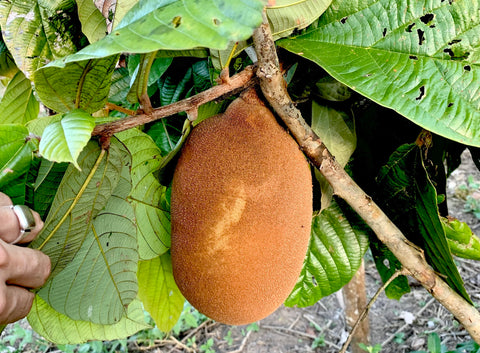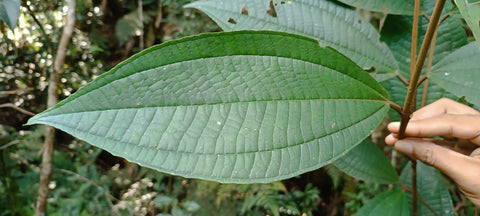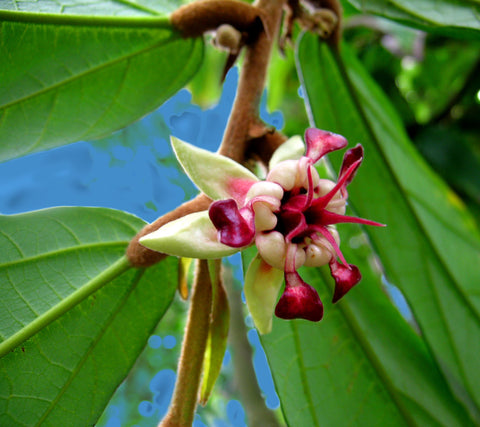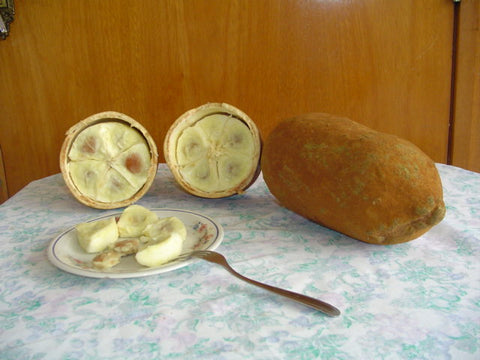Theobroma grandiflorum: Discovering the delights of the Amazon
Theobroma grandiflorum, commonly called cupuaçu, is a wonder of the Amazon rainforest which seduces with its botanical richness and exotic flavors. Native to South America, this plant species plays an essential role in the region's biodiversity and is also a key ingredient in Amazonian cuisine. In this article, we will explore the botanical and taste facets of Theobroma grandiflorum, this little-known plant
 |
 |
 |
Theobroma bicolor, Theobroma grandiflora and Theobroma cacao L.
Theobroma grandiflorum a member of the theobroma.
Theobroma grandiflorum belongs to the Malvaceae family and is closely related to the cocoa tree (Theobroma cacao) and majambo (Theobroma bicolor). in order to be able to distinguish the three trees of your next walk in the Amazonian forest, here are some signs that will help you!

- The tree: The cupuaçu is a medium-sized tree which can reach up to 20 meters in height. Its leaves are oval, bright green, and form a dense and bushy crown unlike cocoa.
- The Flower: The cupuaçu flowers are large and cream to pale yellow in color, which makes them particularly attractive. They are grouped in a cushion on the trunk of the tree (cauliforate).
- Fruit: The fruit of Theobroma grandiflorum is ovoid and can reach a size of 20 to 25 cm. Its skin is thick, rough with hairy down and brown in color. Inside, it contains a creamy-white pulp surrounding numerous round seeds larger than cocoa beans.

Flower of Theobroma grandiflorum, Amazonia cocoa tree
The definition of tropical taste
Theobroma grandiflorum is especially prized for the exceptional flavor of its pulp. its seeds are often exploitable because they are protected by a hard film and are difficult to extract without much effort:
1. Flavor: The pulp of the cupuaçu is tangy, reminiscent of aromas of tropical fruits such as pineapple, jackfruit and melon. It is often described as creamy and sweet with a hint of tartness.
2. Culinary uses: Cupuaçu seeds are used to prepare various products, including drinks, jams, sorbets, desserts, sauces and even chocolate. The pulp is often transformed into juice or paste for various culinary preparations. In Brazil it often accompanies acai puree in sorbets.
3. Traditional drinks: In Brazil, cupuaçu is frequently used to create a delicious drink called "cupuaçuino," a mixture of cupuaçu and cold milk.
4. Nutritional Value: Cupuaçu is rich in essential nutrients, such as vitamins C and B, as well as antioxidants, making it a beneficial food for health.

Theobroma grandiflorum, or cupuaçu, is an iconic Amazonian plant that combines fascinating botanical characteristics with an unforgettable exotic flavor. By combining a distinctive appearance with creamy, sweet and tangy flavors, cupuaçu is becoming a product that attracts many chocolate makers Bean to Bar who are experimenting with a blend between theobroma cacao and grandiflorum.
Luisa Abram
Mission Chocolate

Tab
The Brigaderie
Another resource to learn more about Theobroma grandiflorum



Comments